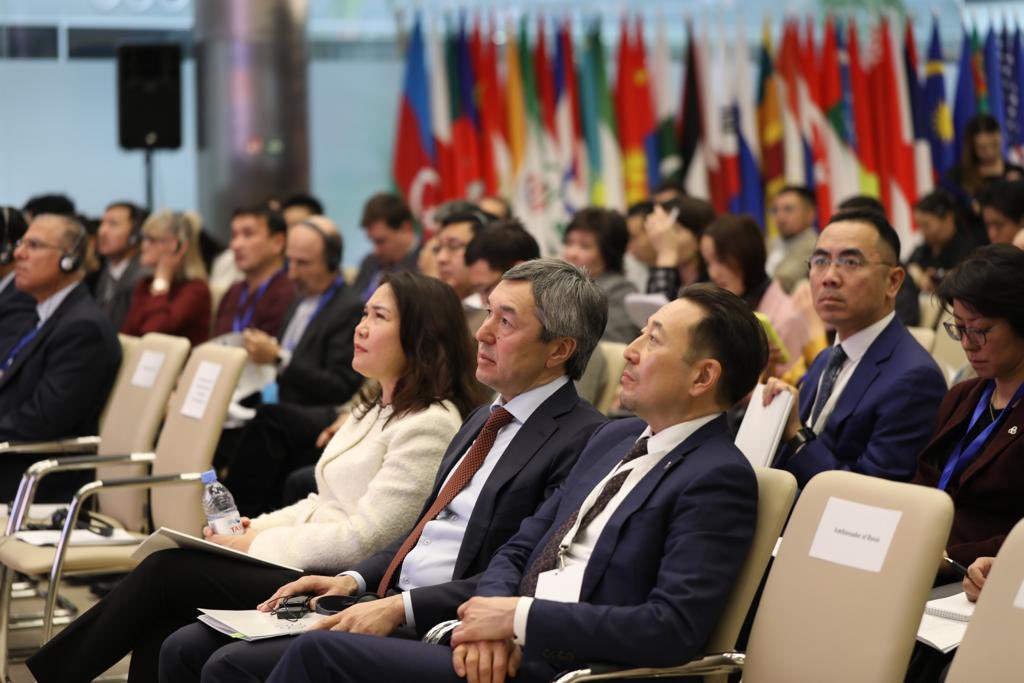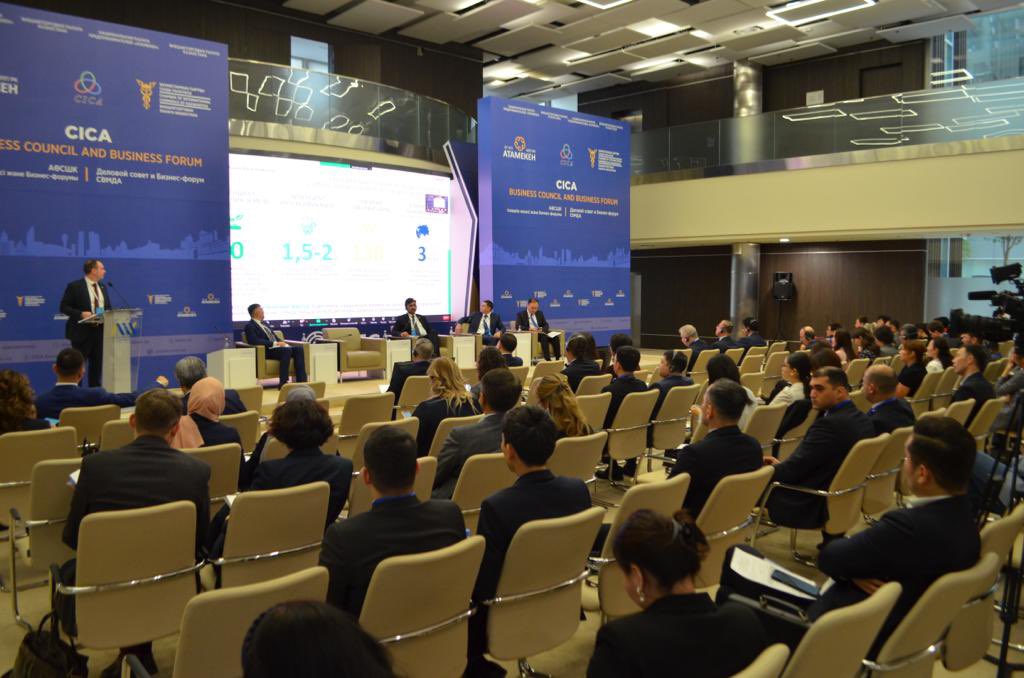ASTANA – The Conference on Interaction and Confidence Building Measures in Asia (CICA) Secretariat and the Atameken National Chamber of Entrepreneurs hosted the sixth plenary session of the CICA Business Council and the eighth Business Forum in Astana on Nov. 13 to step up regional cooperation in renewables, food security and green investments.

Kazakh Deputy Foreign Minister Nazira Nurbayeva, Chairman of the NCE Presidium Raimbek Batalov, and CICA Secretary General Kairat Sarybay. Photo credit: the CICA Secretariat.
The events, which gathered more than 140 participants from 20 countries, aimed to enhance business interaction between CICA member states. The development of cooperation among small and medium-sized enterprises (SMEs) from CICA countries is a blueprint for establishing the regional knowledge exchange network, generating innovative ideas, and sharing practices.
In his welcoming remarks, CICA Secretary General Kairat Sarybay emphasized the paramount importance of the organization’s economic dimension, “especially in the context of the Asian economy’s growth and its increasing significance at both regional and global levels.”

CICA’s priority areas within the economic dimension encompass the SMEs development in energy security, IT, tourism, transport and logistics, agriculture, finance, trade, and investment. Photo credit: the CICA Secretariat.
“The Asian economy’s share of global gross domestic product (GDP) is on a steady rise, estimated to exceed 50% by 2030. CICA’s priority areas encompass energy security, IT, tourism, transport and logistics, agriculture, trade and investment, and finance,” said Sarybay.
Raimbek Batalov, the chairman of the Atameken chamber and the head of the CICA Business Council, noted that the transition to renewable energy sources is “not only an environmentally important step, but also a promising sector for the development of the CICA member countries’ economies.”
Intensified cooperation in this area will considerably reduce dependence on fossil fuels, coal, oil and gas.
“It is obvious that the importance of food exports will steadily grow, largely driven by the consequences of the coronavirus pandemic and the aggravated geopolitical processes that resulted in sanctions, the destruction of global logistics chains, and the fuel and energy crisis,” said Batalov.
Batalov highlighted a raft of business opportunities promoted by the CICA platforms.
“The CICA Business Council gave impetus to project development in the food industry, animal husbandry, grain cultivation, and its processing. Cooperation is at the stage of development not only with CICA member states but also with its observer countries, for example, with Kuwait for the grain processing project worth nearly $2 billion,” he told The Astana Times.
Batalov also mentioned four medium-sized projects in renewable energy production, which are now under consideration. Each of them, he noted, is valued at approximately $20 million.
The entrepreneurial contribution takes center stage in capacity-building in critical areas, as well as in the establishment of specialized international cooperation among business circles of the CICA member countries.
Stanislav Chuyev, a senior analyst at the Eurasian Development Bank (EDB), underlined the immense potential of the Eurasian countries in agriculture, explaining it with the “proximity to sales markets of the fast-growing regions.”
“Until 2035, the climate factor will have a limited impact on food production,” he added.
Discussing the institutional infrastructure with The Astana Times, Programs and Project Department Director at the Islamic Organization for Food Security (IOFS) Ali Zulfiqar said that a bigger focus is needed on the deployment of technologies and investment attraction.
Zulfiqar underscored the importance of linking Kazakhstan to international markets through the enhancement of the transport and logistics sector.
“Governments can provide a conducive environment, but it is the private sector that resolves specific challenges,” he said.
The forum allowed entrepreneurs, experts, and government officials to propel their initiatives in accordance with the green agenda.
Data from the Qazaq Green Association indicates renewables generate 5.9% of total electricity power production. At the same time, Kazakhstan’s strategic development plan aims to reach 6% by 2025 and 15% by 2030.
“Overall, we have 141 renewable stations. Kazakhstan set a goal to commission 13.7 gigawatts of renewables by 2032. The country has signed intergovernmental agreements and memorandums with leading companies, including Total Energies, Nasdaq and China Power,” said Nurlan Kapenov, the chairman of the association.
To facilitate business discussions, the participants also explored cooperation with the CICA Think Tank Forum (TTF), its information and analytical advisory structure, which was renewed and institutionalized at Kazakhstan’s initiative in 2021. The organization of conferences, seminars, round tables, research activities, and exchange of experience are part of the TTF work.
Following the meeting, the CICA Business Council announced the decision to hold its seventh plenary session in the second half of 2024. It will cover the introduction of artificial intelligence, women empowerment in SMEs, their sustainable development, digital trade, supply chains and logistics.
The program concluded with a series of presentations made by Kazakh enterprises in the agricultural industry, green energy and smart farming, particularly from Qazaq Innovation Farm, the Kazakhstan Ormany forest nursery, the Leninsky livestock complex, and the EastAgro farming company.
The previous fifth CICA Business Forum in June 2022 was devoted to the digitalization of business processes in SMEs and ensuring food security in restrictive conditions.
